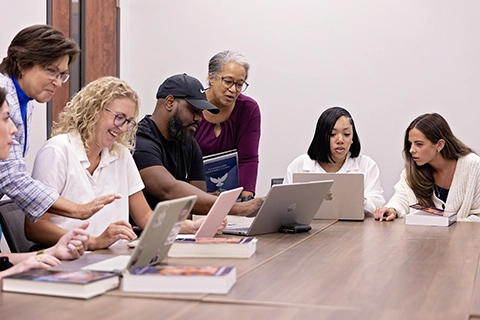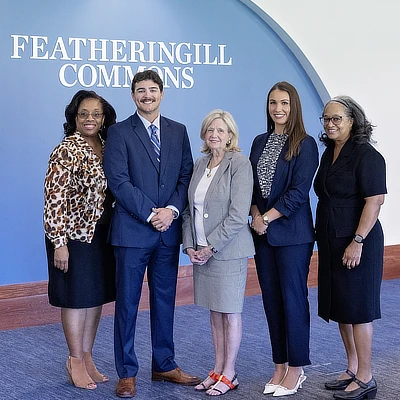
At Cumberland School of Law, the classroom is just the beginning. Through its thriving clinical program, the law school prepares students for real-world practice while expanding legal services within the state of Alabama.
These clinics—offered as academic courses for credit—give upper-level students the opportunity to engage directly in legal work under faculty supervision. They apply their training to real cases with real clients, and the results speak for themselves.
Rachel Martin, JD ’13, serves as the director of clinics, externships and public interest, where she oversees Cumberland’s clinical and externship programs and develops opportunities for students to engage in meaningful public interest work. In this role, Martin works to enhance experiential learning opportunities, connect students with real-world legal practice, and foster partnerships with public interest organizations.
“Clinics are a bridge between legal education and real-world law practice,” Martin said. “Unlike classroom hypotheticals, real cases are rarely linear or simple. Clinics expose students to the challenges of representing clients in matters impacting their livelihoods, homes and freedom. Through clinics, students cultivate their professional identity as service-oriented lawyers and gain confidence in their skills. Because of this, our clinics have exploded in popularity with the students over the past few years, and we are grateful for the support we’ve received that has allowed us to continue expanding our clinical offerings.”
 Each year, Cumberland’s clinics impact hundreds of lives while shaping the professional identity of the students who participate. Since its launch in 2020 by the late Judge John L. Carroll, JD ’74, nearly 900 veterans have received assistance through the Cumberland Veterans Legal Assistance Clinic (C-VETS).
Each year, Cumberland’s clinics impact hundreds of lives while shaping the professional identity of the students who participate. Since its launch in 2020 by the late Judge John L. Carroll, JD ’74, nearly 900 veterans have received assistance through the Cumberland Veterans Legal Assistance Clinic (C-VETS).
Assistant professor Kevin Patton, a U.S. Navy veteran, now leads the C-VETS clinic as the supervising attorney. “Cumberland does a wonderful job of preparing students with the substantive law they’ll need when they graduate, but we also know you learn by doing,” Patton said. “It’s invaluable, I believe, for our students to have these types of experiences under their belt before they even leave the doors of the law school.”
Kaitlyn Boswell, who is served as the inaugural C-VETS student fellow, said, “The clinic allowed me to expand my legal skills and knowledge while making a real impact in the community. It has been an extremely rewarding experience to work alongside other student advocates, professors and community partners to assist veterans in need.”
That spirit of service runs through every clinical offering. On the criminal side, students participate in trial and post-conviction work through the Capital Defense, Criminal Appeals, Innocence, and Parole clinics—tackling complex and often life-altering cases. These clinics have produced not just courtroom-ready graduates but young lawyers with a deep appreciation for due process and the value of access to justice.
LaJuana Davis, the Judge J. Russell McElroy Professor of Law, has been involved with the clinics since their inception. Before joining academia, she worked with the Equal Justice Initiative in Montgomery, specializing in direct appeals and habeas litigation—experience that is central to the Cumberland Innocence Clinic’s success. According to Davis, Alabama is the only southeastern state without a dedicated innocence organization. Under her leadership, alongside clinical adjunct instructor Leslie Coyne, JD '99, Cumberland School of Law fills this gap with the only law school clinic in Alabama focusing on noncapital prisoner innocence claims.
“There is widespread agreement that innocent people should be able to prove their innocence. Doing so in Alabama is harder than in most states,” Davis said.
The Cumberland Innocence Clinic appeals to students who have a personal interest in pursuing criminal justice reform and to those seeking a better understanding of the criminal justice system from either the prosecution or defense perspective. The clinic’s small size provides a unique opportunity for supportive partnerships, allowing the clinic to provide critical access to legal services for those unable to pay for them.
In reviewing innocence claims, students bring fresh eyes to old cases—analyzing legal records, identifying overlooked facts and navigating procedural barriers. Through this process, they gain insights into how the justice system functions and where it falls short.
“In conducting case analyses, the students gain an understanding of how the justice system works; what, if any bias currently exists; what, if any, bias previously existed; what claims of actual innocence have been exhausted; what claims, if any, remain; how to present those claims; how to deal with the court and opposing counsel; and how to deal with the expectations of the victim, the incarcerated person, and that person’s support system,” Davis said.
In addition to C-VETS, the Innocence Clinic, the Capital Defense Clinic and Criminal Appeals Clinic, newer clinics are extending Cumberland’s reach even further. Launched in fall 2023, the Cooney Contracts and Risk Management Clinic pairs students with McGriff, a global insurance brokerage, to work on contract drafting and risk assessment. The aforementioned Parole Clinic, also launched in 2023 in partnership with the nonprofit Redemption Earned, prepares incarcerated clients for parole hearings and gives students the chance to advocate before the Alabama Parole Board.
 Launched in 2024, the Medical-Legal Partnership (MLP) Clinic at UAB Hospital connects students with physicians and social workers to address the legal needs of patients. This interdisciplinary model exposes students to the social determinants of health and the legal issues that often arise alongside them. Cynthia Ransburg-Brown, JD ’98, university counsel in the Office of Counsel at UAB Health System, was instrumental in helping launch the clinic for the law school.
Launched in 2024, the Medical-Legal Partnership (MLP) Clinic at UAB Hospital connects students with physicians and social workers to address the legal needs of patients. This interdisciplinary model exposes students to the social determinants of health and the legal issues that often arise alongside them. Cynthia Ransburg-Brown, JD ’98, university counsel in the Office of Counsel at UAB Health System, was instrumental in helping launch the clinic for the law school.
According to Ransburg-Brown, social issues can impact a patient’s overall recovery and often increase their length of stay in the hospital, and legal issues often arise from social challenges. “The program’s goal is to have the law students interact directly with patients who are referred to the MLP for legal assistance,” she said. “Participating in direct, one-on-one patient/client counseling is an invaluable experience for any law school student. It prepares students to engage with their own clients in the future, even if the future legal topics are unrelated to health care issues. Being able to learn what your client needs and delivering a professional service, in any legal specialty, is the foundation of a good and long-lasting attorney-client relationship.”
“I am consistently impressed with Cumberland students,” Ransburg-Brown added. “Even though the students are meeting patients during a difficult time, the students are respectful, thoughtful and genuinely interested in addressing and resolving the patients’ legal concerns. They are keenly intelligent, quick to identify pertinent issues, and suggest appropriate alternatives.”
Third-year students Nadia McDonald and Eric Posas both participated in the MLP clinic in the spring. "Being part of the Medical Legal Partnership at UAB was an invaluable experience," McDonald said. "It gave me the opportunity to work directly with real clients and see how legal advocacy can make a tangible difference in people’s lives. I found it incredibly rewarding to use the skills I’m developing in law school to help people who are truly in need."
As alumnae, both Ransburg-Brown and Leslie Barineau, JD ’85, who teaches the clinic, are proud to give back to their alma mater to help enhance the student experience. “As a Cumberland graduate and adjunct professor, it is extremely important to be a part of an interesting and engaging educational experience,” Ransburg-Brown said.
Cumberland’s expanding clinical opportunities reflect the law school’s enduring commitment to producing not only capable advocates but also compassionate, service-driven leaders. For alumni who once walked these halls with dreams of making a difference, the clinical program proves those dreams are alive growing with every case taken, every life changed, and every student empowered.
This story was originally featured in the 2025 issue of Cumberland Lawyer magazine.
